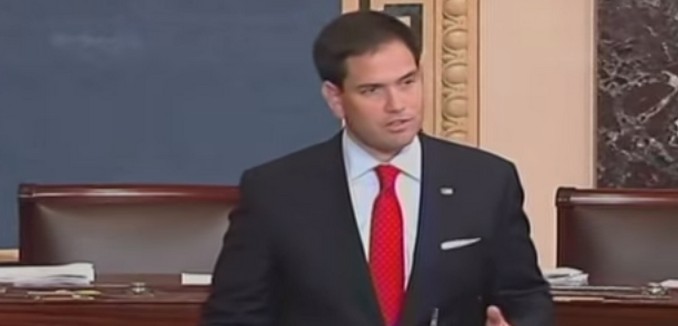In a year-end interview with Steve Inskeep of NPR, Sen. Marco Rubio said that he expected legislation forcing an up or down Congressional vote on any deal with Iran to come up early in this legislative session:
Al-Monitor reports:
Probably the first vote in my sense will be something that will require any deal to come before Congress for approval, the way a treaty would,” Rubio told the “Morning Edition” program in a year-end interview scheduled to run on New Year’s Day. “That’s my sense of where we would initially go.” …
“Some of my colleagues certainly have expressed to me that they would rather pass a bill that does two things: One, it requires congressional approval, which I also support; and two, would trigger sanctions upon a failure of a deal some point over the next six months,” Rubio said. “Additional sanctions would probably be triggered as being put in by a failure to reach an ultimate agreement.”
Sen. Bob Corker (R – Tenn.) explained to columnist George Will how this legislation would work.
The Banking Committee, on which Corker sits, has jurisdiction over Iranian sanctions and has considered new ones. Tiptoeing through a diplomatic minefield, Corker is working on ways for Congress to affect the negotiations positively without jeopardizing them. Corker and Sen. Lindsey Graham (R-S.C.) have drafted legislation requiring the president to submit to Congress, within three days, any comprehensive agreement reached with Iran and would have Congress hold hearings on it in 15 days. Congress would have an additional 15 days to introduce a joint resolution of disapproval. If the president does not submit any agreement, or if a resolution of disapproval is enacted, then prior sanction relief is ended. Iran might stymie this process by prolonging the negotiations until it reaches what Corker thinks Iran considers “the sweet spot”: at least for now, getting to “a screwdriver turn” away from possessing a weapon, then pausing.
Also pending is legislation authored by Sens. Robert Menendez (D – N.J.) and Mark Kirk (R – Ill.), which would seek to re-impose sanctions on Iran. Both bills would have to be introduced in the new session.
Sen. Roger Wicker (R – Miss.) observed that bills on Iran would be passed “with overwhelming bipartisan support in both the House and the Senate.” The observation about the bipartisan support for such legislation was seconded by Rubio, who said that bills demanding Congressional approval for any deal with Iran or imposing more sanctions on Iran, “have a supermajority, a veto-proof majority.”
Reports over the past year that the administration sought “to circumvent Congress in securing a nuclear deal with Iran” have spurred bipartisan support for increased Congressional oversight over the outcome of the nuclear talks with Iran. Both before and after the November agreement to extend nuclear talks with Iran Congressional leaders from both parties have sought greater legislative oversight of the negotiations.
[Photo: Senator Marco Rubio / YouTube ]




